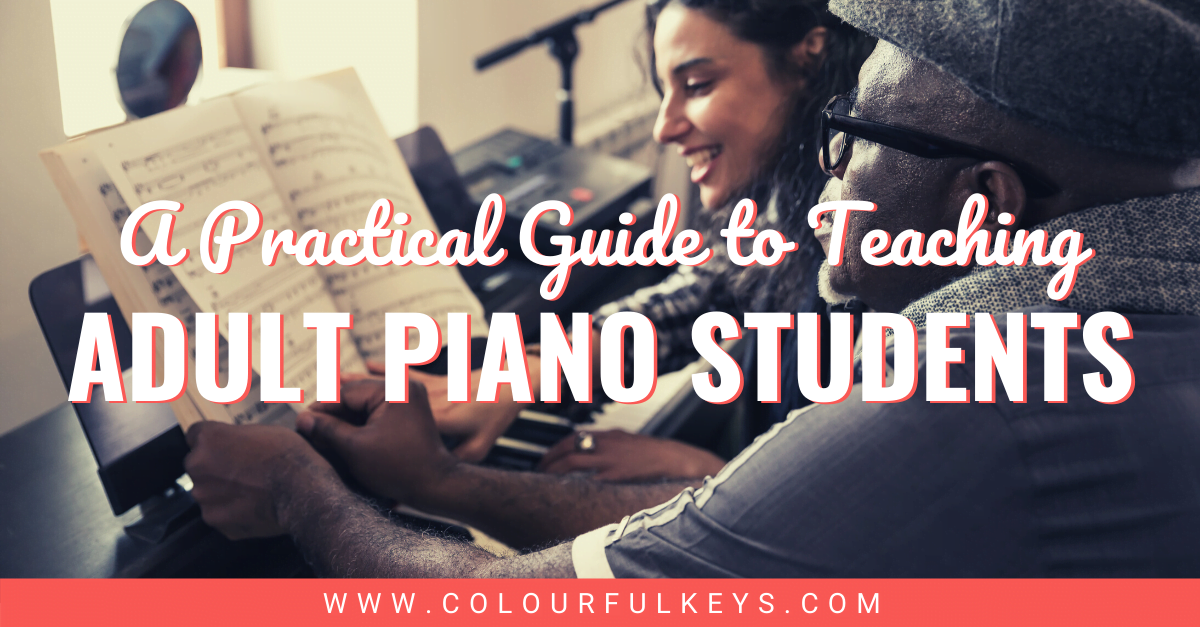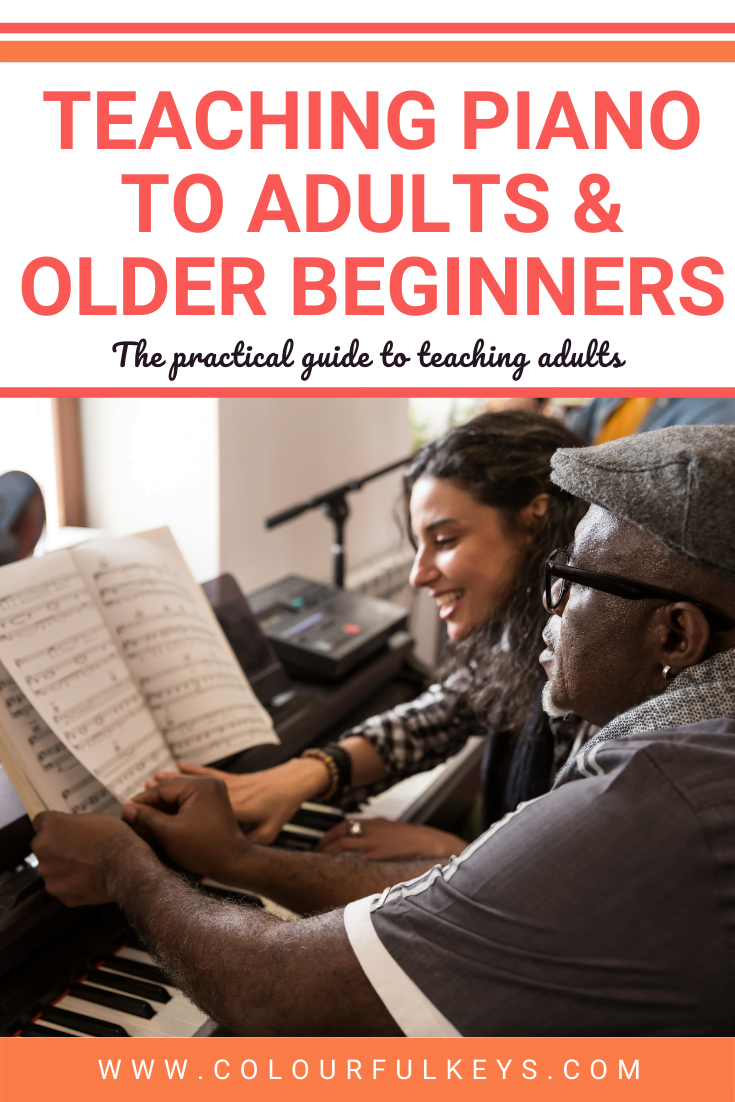Teaching adult piano students has unique challenges. I know many piano teachers will avoid taking on adults because they’ve had bad experiences in the past with commitment or expectations. But teaching adults has great advantages, too. If you can learn the skills needed to teach this demographic, they can be a valuable part of your studio.

This post was originally published in March 2017 and updated in February 2021.
I’ve come to love teaching adult piano students, but I didn’t always. I used to have the same complaints as other teachers: the drop-out rate, the lack of practice or the frequently cancelled lessons.
But my adults are now some of my most dedicated and reliable students.
Here are the four key changes I made which flipped the switch and made teaching adult piano students my strength – not my headache.
And for more resources on teaching older beginners, head over to my Planning Lessons hub page where you’ll find an entire section devoted to teaching older beginners.
1. Understanding goals
One of the benefits of teaching adults is that they should be able to articulate what they want, at least a little more clearly than children or teens.
When meeting with a prospective adult student for the first time, make sure to talk about their reasons for wanting to take lessons:
- What kind of music would they like to play?
- Do they want to play with other musicians?
- Or perform?
- Or play Elton John arrangements on a Sunday afternoon?

Knowing where your adult students want to go is very important. After all, they’re choosing to go to these lessons and pay for them. If you’re not taking them down the right path, they’re not going to stick around. And you won’t know what path they want unless you ask.
What if they don’t know or won’t say? Some adults can be a bit shy or hesitant to tell you their goals at the outset, while others genuinely don’t know for sure which way to go.
That’s OK. Suggest a path for them to take for now. Then once the lessons begin, continue to check in with them regularly about their goals and repertoire choices.
2. Expectations
Just like with goals, it’s important to broach the subject of expectations – both yours and theirs – at the very first meeting, before lessons even start.
Let’s start with the teacher’s expectations. For instance:
- Do you expect a certain amount of practice to be put in?
- Do they understand your policies including reschedules/cancellations?
- What happens if they don’t like a piece – can they just skip it?
- Do you want them to perform in concerts or other events?
And then there are the student’s expectations. This is the part that most commonly goes awry when teaching adult music students: Make sure they have realistic ideas and assumptions.
- How much are they going to be able to practice?
- How quickly are they expecting to progress? Try picking out a particular piece they want to play and give them an idea of how far away that is, if they stick to their practice projection.
- Do they have a suitable practice instrument at home?
This might look like you’re going to scare your potential new adult student away as soon as they set foot in the door. Keep it conversational but, yes, you really do need answers to these questions. Otherwise you’re setting yourself up for a mismatch down the road which could have been avoided.
If you align your expectations properly, your adult student could be in your studio for years to come. If you don’t, they’ll be driving away faster than you can say: “unrealisticexpectations“.
3. Keep it Light
Now that goals and expectations are all aligned and the lessons are actually beginning, let’s talk about approach.
You need to get work done and improve their skills, for sure. I’m not saying don’t get serious about the piano – just don’t be too heavy.

Piano is (most likely) supposed to be a fun, recreational activity for your adult student. Even if they’re very good, this isn’t their job. It’s supposed to be enjoyable and low stakes.
So don’t nag them if they don’t practice.
Don’t tell them anything “isn’t good enough” or “needs dynamics” or “lacks phrasing”. Correct these things, but correct them as a coach or helpful guide – not as a critic.
Align everything to their goals, not your own standards. Help your adult student to play well, within their parameters. Don’t force them into a certain curriculum and suck all the enjoyment out of it.
Many of my adult students enjoy their scales and exercises. But if your student hates them, you have my permission to stop. Find another way to teach them the theory and technique of scales. Or wait until they need it for their repertoire.
Above all, make sure the lessons are fun and helpful. Adults more than children can be very self-aware and self-critical. Which brings me to my next point…
4. Three Stars
Do you know the phrase “three stars and a wish”? It’s a catchy way to remember to give three compliments for every one thing to improve. It’s often cited by teachers of all subjects.

But we can sometimes forget this praise when it comes to our adult students.
We may feel like adult piano students don’t need the outside validation in the same way that kids do. Maybe we think it will come across as patronising or insincere.
Don’t think that way. Adult students often need more praise, not less.
Even when given compliments, many adult students will brush them away, passing the reward to someone else (“oh, well it’s a lovely arrangement”) or diminishing it by gradients (“It’s been a few weeks but it is a bit better, it sounds OK now alright”).
Just as with kids, make sure the praise is enthusiastic, and TRUE. Don’t give some half-hearted compliment – they’ll see right through it. And don’t just say it; exclaim it.
Make sure you help your adult students to see and celebrate their wins. Otherwise they’ll simply brush by them on their way to the next thing. We adults are terrible for doing that.
Do you like teaching adult piano students?
What are some differences you’ve noticed between teaching adults and teaching kids? Do you struggle to keep adult students in your studio?
Share your experiences in the Vibrant Music Studio Teachers community on Facebook.

Thank you Nicola for these tips. I have an adult student who has just started having lessons with me. She was really excited when I showed her the bionic pianist tip you shared about using your whole arm to play. It made sense to her and she was really grateful. The younger students just weren’t that bothered! Thank you for sharing!
Yes, certainly adult students will have more of an understanding of why something like that is important, and might just take it and run with it themselves. Younger students need much more teacher guidance and input to use strategies like that.
Glad you enjoyed the article! 🙂
Thank you for this! It has helped me restructure the questions I need to ask my adult students!
Laura
That’s great to hear Laura. 🙂
I like how you talked about encouraging adult students taking piano by giving them compliments that are enthusiastic. I know I have a tendency to brush away and rationalize compliments out unless they are really spontaneous and true. Thank you for pointing out how adults are good at brushing by compliments on their way to the next thing and will need a celebration to take a win seriously.
Me too! I think it’s a big, important part of our role to help them see their wins. 🙂
Do you have a preference for an adult method book?
Yes I have several I like. I think my fave right now for most adults would be Fired Up! by Jennifer Eklund.
What other books do you favor for adult beginners?
Here’s a post you may find helpful https://colourfulkeys.ie/repertoire-adult-piano-students/
Hello, very interesting commentary you offer. I have had adult students ask me when they will start playing like me, ha ha, and I ask them how much serious work are they willing to do. I’ve been playing my whole life and they just started playing as adults and most of them work full-time or manage their familes. I do try to make it fun for them as well, but I am also honest with them and tell them the more work (Practice) they put in, the more results they will see. “Repetition is the name of the game is what I say”.
Thank you for this article. I particularly liked the three stars and a wish idea!